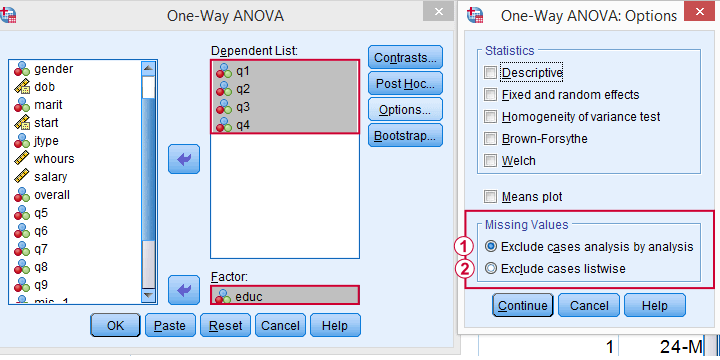

Specifically, it will produce: a Kolmogorov-Smirnov test, a Shapiro-Wilk test, a normal Q-Q plot, and a detrended normal Q-Q plot.

(Note that it is not possible to request just the inferential statistics without the plots, or vice versa). The Normality plots with tests option will produce both the inferential statistical tests of normality and the normality plots. If a factor variable is specified, those groups will also appear within that boxplot.

The Outliers option prints the top five highest and lowest values, and what case they are associated with. See this page on the official IBM guide for more information. The M-estimators option produces alternatives to the mean and median. Note that you can't pick and choose which of these descriptive statistics to view - it's all of them or none of them. The Descriptives option produces a set list of descriptive statistics: mean, confidence interval for the mean (default 95% CI), 5% trimmed mean, median, variance, standard deviation, minimum, maximum, range, interquartile range (IQR), skewness, kurtosis, and standard errors for the mean, skewness and kurtosis. Choices are Descriptives (enabled by default), M-estimators, Outliers, and Percentiles. If not specified, SPSS will use the row number to label the case.ĭ Statistics: Optional choices for what statistics to report. These names appear in reports of outliers. The procedure will produce individual summaries of the numeric variable with respect to each category.Ĭ Label Cases by: (Optional) An ID variable with "names" for each case. To run the Explore procedure, click Analyze > Descriptive Statistics > Explore.Ī Dependent List: The continuous numeric variables you wish to analyze.ī Factor List: (Optional) Categorical variables to subset the analysis by. It can also be used to assess the normality of a numeric scale variable with special inferential statistics and detailed diagnostic plots. The Explore procedure produces detailed univariate statistics and graphs for numeric scale variables for an entire sample, or for subsets of a sample.


 0 kommentar(er)
0 kommentar(er)
